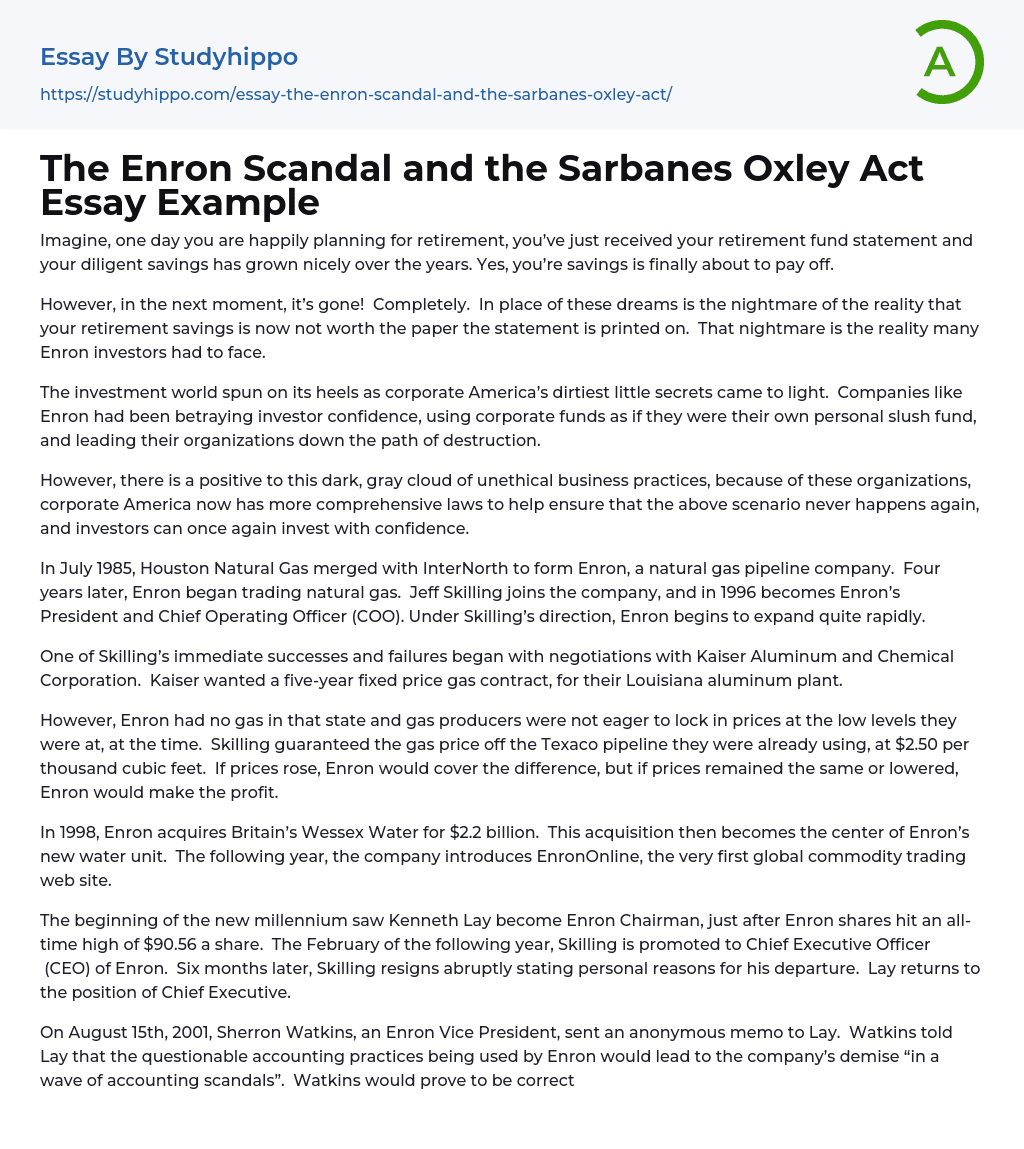

The Enron Scandal and the Sarbanes Oxley Act Essay Example
Imagine a future day when you are happily preparing to retire, receiving your retirement fund statement and witnessing the growth of your dedicated savings over time. Finally, your savings are about to be recognized as they deserve.
However, abruptly, it completely disappears and is substituted by the alarming truth that your retirement savings have no value anymore; they are only symbols on a piece of paper. This terrifying reality was encountered by multiple Enron investors.
The investment world was shocked as corporate America's concealed wrongdoings became public. Companies such as Enron breached investor trust by misusing corporate funds, behaving as if they were their own personal piggy banks, resulting in disastrous consequences for their organizations.
Despite the negative impact of unethical business practices,
...a positive outcome is that these organizations have prompted the creation of more comprehensive laws in corporate America. These laws aim to prevent the recurrence of such scenarios and allow investors to regain their confidence in investing.
In July 1985, the merger of Houston Natural Gas and InterNorth led to the establishment of Enron, a company engaged in natural gas pipeline operations. Enron ventured into natural gas trading four years later. Jeff Skilling, who joined the company, eventually became its President and Chief Operating Officer (COO) in 1996. Under Skilling's leadership, Enron underwent rapid expansion.
Skilling experienced both success and failure when negotiating with Kaiser Aluminum and Chemical Corporation. Kaiser was interested in securing a five-year fixed price gas contract for their Louisiana aluminum plant.
Despite Enron lacking gas in that specific state and gas producers being
unwilling to guarantee prices at the current low levels, Skilling still promised to establish a fixed gas price of $2.50 per thousand cubic feet from the Texaco pipeline they were already using. Enron would cover any rise in prices, but if prices stayed the same or dropped, Enron would make a profit.
Enron acquires Wessex Water for $2.2 billion in 1998, establishing it as the foundation of Enron's water division. In 1999, Enron introduces EnronOnline, the first online platform for trading commodities worldwide.
At the beginning of the 2000s, Kenneth Lay becomes Enron Chairman as the company's shares hit a historic peak of $90.56. In the following year, Skilling is named Enron's CEO. But after just six months, Skilling unexpectedly steps down for personal reasons. Lay subsequently takes back his position as Chief Executive.
On August 15th, 2001, Sherron Watkins, a Vice President at Enron, sent Lay a memo warning about the questionable accounting practices that would ultimately cause the company to collapse. The memo was sent anonymously but accurately predicted the outcome of the accounting scandals that unfolded.
Enron's collapse resulted from its use of fraudulent accounting techniques. Despite being the seventh-largest company in the United States, Enron played a crucial role in advancing power, communications, and weather securities.
Despite its impressive achievements, the company will always be remembered as a notable example of corporate fraud in America. Fortune Magazine recognized it as America's Most Innovative Company for five years in a row and included it on their list of the 100 Best Companies to Work for in America in 2000. However, they ultimately faced downfall due to a
scandal.
Rumors of bribery and political pressure started to emerge, affecting contracts in Central and South America, Africa, and the Philippines, particularly the $30 billion Indian MSEB contract. There were suspicions that Enron had utilized political connections to exert influence on the board. Additionally, questionable accounting practices further exacerbated these issues.
The company's bankruptcy in mid-November 2001 was caused by irregular accounting procedures done in conjunction with its accounting firm, Arthur Anderson. The value of Enron investors' equity per share dropped drastically from $85 to just 30 cents, resulting in a significant decline in the blue chip stocks' value.
- Accounts Receivable essays
- Auditor's Report essays
- Balance Sheet essays
- Costs essays
- Financial Audit essays
- International Financial Reporting Standards essays
- Tax essays
- Accountability essays
- Cash essays
- Principal essays
- Management Accounting essays
- Internal Control essays
- Accounting Software essays
- Cash Flow essays
- Accounting essays
- Andrew Carnegie essays
- Automation essays
- Business Cycle essays
- Business Intelligence essays
- Business Model essays
- Business Operations essays
- Business Software essays
- Cooperation essays
- Cooperative essays
- Corporate Social Responsibility essays
- Corporation essays
- Customer Relationship Management essays
- Family Business essays
- Franchising essays
- Harvard Business School essays
- Harvard university essays
- Human Resource Management essays
- Infrastructure essays
- Inventory essays
- Logistics essays
- Management essays
- Manufacturing essays
- Market essays
- Marketing essays
- Multinational Corporation essays
- News Media essays
- Online Shopping essays
- Quality Assurance essays
- Richard Branson essays
- Sales essays
- Selling essays
- Shopping Mall essays
- Small Business essays
- Starting a Business essays
- Stock essays



